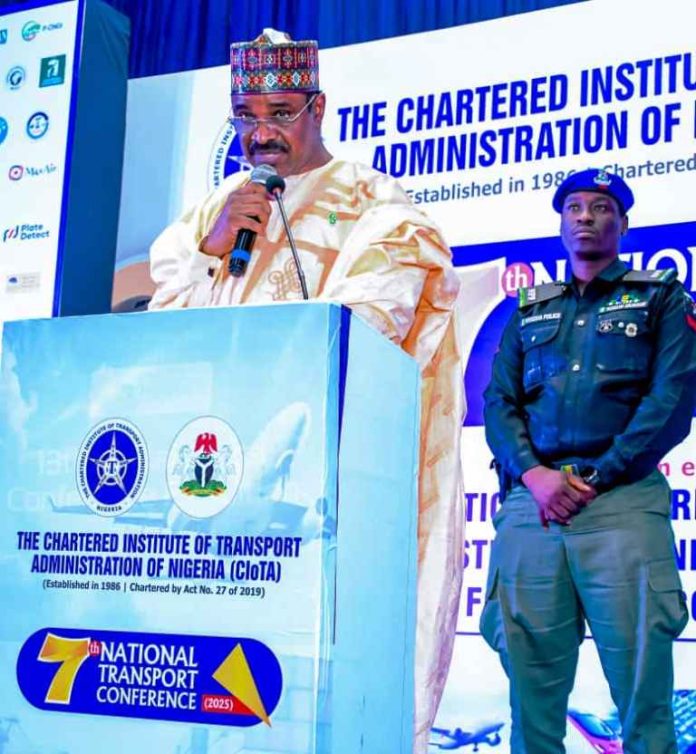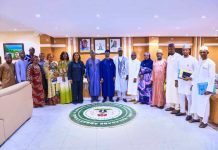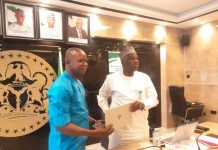
The Honourable Minister of Transportation, Senator Said Ahmed Alkali, has reaffirmed his commitment to advancing regulatory frameworks that will ensure a coordinated, transparent and accountable transport system across the country.
Speaking at the 7th National Conference of the Chartered Institute of Transport Administration of Nigeria (CIOTA) in Abuja on Tuesday, the Minister said: “We are positioning Nigeria to harness smart mobility solutions, intelligent transport systems (ITS), and blockchain- enabled logistics to enhance transparency and sustainability.”
Speaking further, Senator Alkali disclosed that, the first- ever National Land Transport Policy has been validated by stakeholders and approved by the Federal Executive Council (FEC). Describing it as a historic milestone that would harmonise standards, improve coordination, and foster private sector participation.
“Upon my appointment as the Minister, I set it as one of my critical objectives and with commitment, perseverance, cooperation of all the major stakeholders, of which CIOTA and its key members made significant contributions, and finally, with the support of Mr. President, we were able to get the policy approved at the Federal Executive Council.” Alkali said.
According to him, the successful test flight of logistics drones developed by engineers at the Nigerian Institute of Transport Technology (NITT), Zaria, exemplifies further commitment to indigenous innovation, adding that the unbundling of the Nigerian Railway Cooperation was underway to improve operational efficiency and service delivery.
The conference themed: “Repositioning Nigeria’s Transport Infrastructure and Governance Models for Global Competitiveness,” attracted top policymakers, industry and development partners who examined strategies to transform Nigeria’s multimodal transport system into a globally competitive network.
The Minister who said the theme resonates strongly with the Federal Government’s Renewed Hope Agenda, which seeks to transform Nigeria into a fully integrated, productive, and competitive economy — with transportation as a primary enabler, quickly commended His Excellency, President Bola Ahmed Tinubu, GCFR, whose visionary leadership according to him, continues to provide the enabling environment for sustainable growth in the transport and logistics ecosystem. Under this administration, Alkali said, critical reforms and investments have accelerated across all transport modes, describing it as a milestone framework that will harmonise standards, improve coordination, and foster private-sector participation.
The special guest of honour of the conference, his Excellency, the Governor of Kaduna State, Senator Uba Sani, said, the state transport systems have been overhauled for effective transport systems since he assumed office about two and half years ago, placing the overhauling of Kaduna’s transport ecosystem at the centre of the administration’s urban-renewal agenda. These according to the Governor, are not abstract promises; but financed projects under construction initiatives, and in many cases, services already being delivered to the citizens.
“The first act in this story has been the roads revolution: whereas only thirty per cent of our twenty-three local government areas previously had truly motorable roads, we have since launched 85 urban and rural roads spanning 785 kilometres, with nearly half already completed. These new arteries open corridors of commerce, connect farmers to markets, traders to customers, and commuters to opportunities. Bridges, utilities and public-transport facilities are likewise being restored to support growth and invite investment’’, the governor said.
Furthermore, he said : “In tandem, we unveiled the Kaduna Bus Rapid Transit (KBRT); the first of its kind in Northern Nigeria, and only the second in the country after Lagos. A partnership between the State Government and the Agence Française de Développement, the KBRT will feature a dedicated 24- km corridor from Rigachikun to Sabon Tasha and is supported by more than thirty billion Naira in counterpart funding. With 120 articulated buses powered by Compressed Natural Gas, we expect a thirty-eight per cent reduction in CO2 emissions and fuel- cost savings of approximately 1.8 billion Naira annually. The ripple effect in jobs will be profound: 3,200 direct roles and over 11,000 indirect opportunities within ICT, security, retail, maintenance and allied services.”
Earlier, the CIOTA President, Prince Segun Obayendo, said the theme for the event, “Repositioning Nigeria’s Transport Infrastructure and Governance Models for Global Competitiveness” acknowledged that, Nigeria was not just building transport systems, but was building the arteries of a modern economy.
He further said: “Global competitiveness in transport means seamless multimodal integration. It means a passenger can travel from Kano to Lagos by rail, connect to an international flight, with their cargo moving simultaneously through efficient logistics chains. It means governance models that prioritise efficiency over bureaucracy, innovation over tradition”
“With an estimate of 27 universities offering transportation programs, six polytechnics providing logistics and transport education, and five institutes of maritime studies, we have the educational infrastructure. However, the incessant mishap on our inland waterways is concerning because the operators are less than professional. If the sector is not professionalised, what becomes of our children pursuing these courses? This underscores the urgent need for rigorous training, certification, and enforcement of professional standards across all transport modes.” Prince Segun Obayendo declared.
Signed
Janet McDickson Noah
Director, Press and Public Relations





